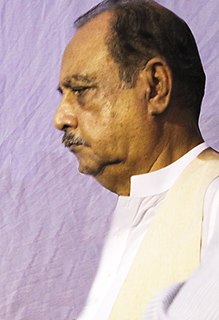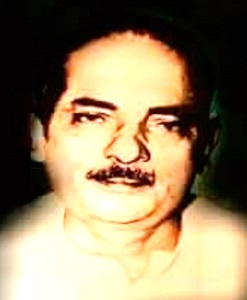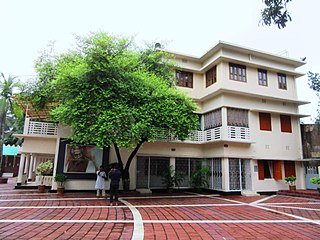Rab is a surname. Notable people with the surname include:
- A. S. M. Abdur Rab (born 1945), Bangladeshi politician
- Mohammad Abdur Rab (Bir Uttam) (1919–1975), Bangladeshi army officer
- Tibor Rab (born 1955), Hungarian footballer
Rab is a surname. Notable people with the surname include:

The national flag of Bangladesh, was adopted officially on 17 January 1972. It consists of a red disc on top of a dark green banner. The red disc is offset slightly toward the hoist so that it appears centered when the flag is flying. While there are many interpretations, according to Shib Narayan Das who put the map on the first flag design, green on the flag represented the landscape and the red circle represented the sun, symbolising a new day and end of oppression.

Rapid Action Battalion or RAB, is an anti-crime and anti-terrorism unit of the Bangladesh Police. It consists of members of the Bangladesh Police, Bangladesh Army, Bangladesh Navy, Bangladesh Air Force, Border Guard Bangladesh, Bangladesh Civil Service and Bangladesh Ansar. It was formed on 26 March 2004 as RAT, and commenced operations on 14 April 2004.
Cheema is a Punjabi Jat clan of India and Pakistan. They have a high concentration in the villages of Gujranwala and adjoining parts of Sialkot. Most people with the surname are Sikhs in East Punjab and Muslims in West Punjab.

The Jatiya Samajtantrik Dal is a political party in Bangladesh. The party was founded by Serajul Alam Khan.

A. S. M. Abdur Rab is a Bangladeshi politician. He is the founder secretary general of the Jatiya Samajtantrik Dal. In 1985, Rab and his followers left the party and formed a new party Jatiya Samajtantrik Dal-JSD, known as JSD (Rab). He served as the Jatiya Sangsad Member from Lakshmipur-4 and the Minister of Shipping and later the Minister of Fisheries and Livestock during 1996-2001 of the first Sheikh Hasina Cabinet.
Abdur Razzaq is a male Muslim given name, and in modern usage, surname. It is built from the Arabic words Abd, al- and Razzaq. The name means "servant of the all-provider", Ar-Razzāq being one of the names of God in the Qur'an, which give rise to the Muslim theophoric names.
Abdul Rashid is a male Muslim given name, and in modern usage, surname. It is built from the Arabic words Abd, al- and Rashid. The name means "servant of the right-minded", Ar-Rashīd being one of the names of God in the Qur'an, which give rise to the Muslim theophoric names.
The Jatiya Samajtantrik Dal is a political party in Bangladesh. It was formed in 2002, through a split from the original Jatiya Samajtantrik Dal. The party is sometimes referred to as JSD (Rab), to differentiate it from the mother party led by Hasanul Haq Inu. The Election Commission of Bangladesh calls the party Jatiya Samajtantrik Dal-JSD and the Inu-led party Jatiya Samajtantrik Dal-Jasad.
Biswas is a surname commonly used by the Bengali community. The surname was an honorary title bestowed on persons who were relied upon for the work of accounts, receipts and expenditure. Among Bengali Hindus, the surname is associated primarily with Mahishyas, Scheduled Castes and Kayasthas as well. The surname is also found among some Muslim and Christian Bengalis. In Bengali, Biswas means faith or trust.
Abdur Rahman is a masculine Muslim name.
Abdur Rab is a male Muslim given name, and in modern usage, surname. It is built from the Arabic words Abd, al- and Rabb. The name means "servant of the Lord", a Muslim theophoric name.
AbdurRahim is a male Muslim given name, and in modern usage, surname. It is built from the Arabic words Abd, al- and Rahim. The name means "servant of the merciful", Ar-Rahim being one of the names of God in the Qur'an, which give rise to the Muslim theophoric names.
Mohammad Abdur Rab, Bir Uttom also known as M A Rab, was the first Chief of Staff of the Bangladesh Army from 10 April 1971 till 6 April 1972.
Razzaq, Razzak or Razak is one of the names of God in Islam, meaning provider or sustainer. Razzaq may refer to:

Abdur Rob Serniabat (1921-1975) was a Bangladeshi politician and the former water resources minister. He was the brother-in-law of Sheikh Mujibur Rahman, founding father of Bangladesh, and the maternal uncle of Sheikh Hasina, the four-time prime minister of Bangladesh. He was killed during the assassination of Sheikh Mujibur Rahman on 15 August 1975.
Khondakar is a Bengali Muslim surname found in Bangladesh and neighbouring East Indian regions.
Chowdhury is a title of honour, usually hereditary, originating from the Indian subcontinent. It is an adaption from Sanskrit. During the Mughal rule, it was a title awarded to eminent people, while during British rule, the term was associated with zamindars and social leaders. The common female equivalent was Chowdhurani. Many landlords under the Permanent Settlement carried this surname. Land reforms after the partition of India abolished the permanent settlement. In modern times, the term is a common South Asian surname for both males and females.

The Sheikh Mujib family is a prominent Bangladeshi political dynasty, which primarily consists of Sheikh Mujibur Rahman, Sheikh Hasina and their relatives.
Taluqdar is a historic occupational title in South Asia which is now used as a surname. Notable people with the surname include:

Ḥāfiẓ Aḥmad Jaunpūrī was an Indian Muslim scholar, religious preacher and social worker. As the son and successor of Karamat Ali Jaunpuri, he led the Taiyuni reformist movement in Bengal.